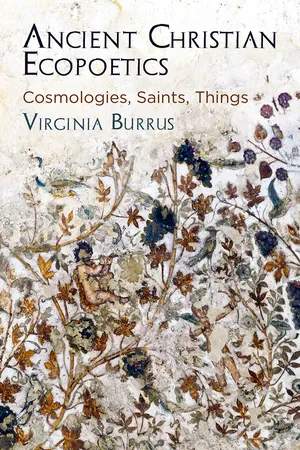![]()
Notes
Introduction
Note to epigraph: Timothy Morton, The Ecological Thought (Cambridge, MA: Harvard University Press, 2010), 134.
1. Morton, Ecological Thought, 19.
2. This is a complicated “we,” as neither the responsibility for ecological degradation nor its effects fall evenly on the human species; see Andreas Malm and Alf Hornborg, “The Geology of Mankind? A Critique of the Anthropocene Narrative,” Anthropocene Review 1 (2014): 62–69. For a defense of the concept of the anthropocene and the significance—and challenge—of thinking the human on the scale of the species, see Timothy Morton, Dark Ecology: For a Logic of Future Coexistence (New York: Columbia University Press, 2016), 14–25.
3. Christopher Schliephake, “Introduction,” in Ecocriticism, Ecology, and the Cultures of Antiquity, ed. Christopher Schliephake (Lanham, MD: Lexington, 2017), 4.
4. J. Donald Hughes, Pan’s Travail: Environmental Problems of the Ancient Greeks and Romans (Baltimore: Johns Hopkins University Press, 1994), 196.
5. Bill McKibben, “Foreword,” in Toward an Ecology of Transfiguration: Orthodox Christian Perspectives on Environment, Nature, and Creation, ed. John Chryssavgis and Bruce V. Foltz (New York: Fordham University Press, 2013), xiii.
6. Todd LeVasseur and Anna Peterson, “Introduction,” in Religion and Ecological Crisis: The “Lynn White Thesis” at Fifty, ed. Todd LeVasseur and Anna Peterson (New York: Routledge, 2017), 2.
7. Lynn White Jr., “The Historical Roots of Our Ecological Crisis,” Science 155, no. 3767 (1967): 1205.
8. White, “Historical Roots,” 1207.
9. Willis Jenkins, “After Lynn White: Religious Ethics and Environmental Problems,” Journal of Religious Ethics 37 (2009): 288.
10. Donovan O. Schaefer, Religious Affects: Animality, Evolution, and Power (Durham, NC: Duke University Press, 2015), 9.
11. Morton, Dark Ecology, 131.
12. See Christopher Key Chapple, “Lynn White Jr. and India: Romance? Reality?” in LeVasseur and Peterson, Religion and Ecological Crisis, 110–20.
13. Douglas E. Christie, The Blue Sapphire of the Mind: Notes for a Contemplative Ecology (New York: Oxford University Press, 2013).
14. See the Forum on Religion and Ecology at Yale (website), School of Forestry and Environmental Studies, Yale University, accessed July 28, 2017, http://fore.yale.edu/.
15. Morton, Ecological Thought, 134. Morton is especially drawn to the resources of Buddhism for thinking ecologically; see Marcus Boon, Eric Cazdyn, and Timothy Morton, Nothing: Three Inquiries in Buddhism (Chicago: University of Chicago Press, 2015).
16. Whitney A. Bauman, “What’s Left (Out) of the Lynn White Narrative?” in LeVasseur and Peterson, Religion and Ecological Crisis, 167.
17. See for example the defense of Protestant Christianity by Michael S. Northcott, “Lynn White Jr. Right and Wrong: The Anti-Ecological Character of Latin Christianity and the Pro-Ecological Turn of Protestantism,” in LeVasseur and Peterson, Religion and Ecological Crisis, 61–74.
18. While White has frequently been viewed as “anti-Christian,” Matthew T. Riley brings out his positive commitment to the reform of Christian theology (“A Spiritual Democracy of All God’s Creatures: Ecotheology and the Animals of Lynn White Jr,” in Divinanimality: Animal Theory, Creaturely Theology, ed. Stephen D. Moore [New York: Fordham University Press, 2014], 241–60).
19. Scott Knickerbocker, Ecopoetics: The Language of Nature, the Nature of Language (Amherst: University of Massachusetts Press, 2012), 17–18.
20. David L. Miller, “Theopoetry or Theopoetics?” Crosscurrents 60, no. 1 (March 2010): 8.
21. Angela Hume, “Imagining Ecopoetics: An Interview with Robert Hass, Brenda Hillman, Evelyn Reilly, and Jonathan Skinner,” Interdisciplinary Studies in Literature and Environment 19, no. 4 (2012): 756. For a concise discussion of how one might define “ecopoetics,” see also Jonathan Skinner, “Ecopoetics,” Jacket2 (2011), accessed December 11, 2017, http://jacket2.org/commentary/jonathan-skinner.
22. Hume, “Imagining Ecopoetics,” 761.
23. John Sallis, Platonic Legacies, SUNY Series in Contemporary Continental Philosophy (Albany: State University of New York Press, 2004), 93.
24. See especially Timothy Morton, “Queer Ecology,” Proceedings of the Modern Language Association 125, no. 2 (2010): 273–82.
25. See especially Jane Bennett, Vibrant Matter: A Political Ecology of Things (Durham, NC: Duke University Press, 2010).
I. Beginning Again with Khora: Traces of a Dark Cosmology
Note to epigraph: John Sallis, Platonic Legacies, 93.
1. Note that my own habit is to transliterate ξώρα as khora, but I follow Sallis in an alternate transliteration when invoking his distinctive use of the term chorology.
2. See, e.g., Julia Kristeva, “Revolution in Poetic Language,” in The Kristeva Reader, ed. Toril Moi (Oxford: Basil Blackwell, 1986), 89–136; Kristeva, Powers of Horror: An Essay on Abjection, trans. Leon S. Roudiez (New York: Columbia University Press, 1982); Luce Irigaray, Speculum of the Other Woman, trans. Gillian C. Gill (Ithaca, NY: Cornell University Press, 1985; French ed., 1974), esp. 168–79; Irigaray, An Ethics of Sexual Difference, trans. Carolyn Burke and Gillian C. Gill (Ithaca, NY: Cornell University Press, 1993), 34–55; Jacques Derrida, “How to Avoid Speaking: Denials,” in Derrida and Negative Theology, ed. Harold Coward and Toby Foshay (Albany: State University of New York Press, 1992), 73–142; Derrida, “Khōra,” in On the Name, trans. David Wood, John P. Leavey, and Ian McLeod (Stanford, CA: Stanford University Press, 1995), 87–127.
3. For an exception to this general rule, see Rebekah Sheldon, “Form/Matter/Chora: Object-Oriented Ontology and Feminist New Materialism,” in The Nonhuman Turn, ed. Richard Grusin (Minneapolis: University of Minnesota Press, 2015), 193–222.
4. See also Melissa Lane, Eco-Republic: What the Ancients Can Teach Us About Ethics, Virtue, and Sustainable Living (Princeton, NJ: Princeton University Press, 2012). Lane argues that Plato’s Republic is “a primer in the functioning of political possibility” (22) that may offer a paradigm for the transformations of soul and city required to meet the challenges of sustainabili...

